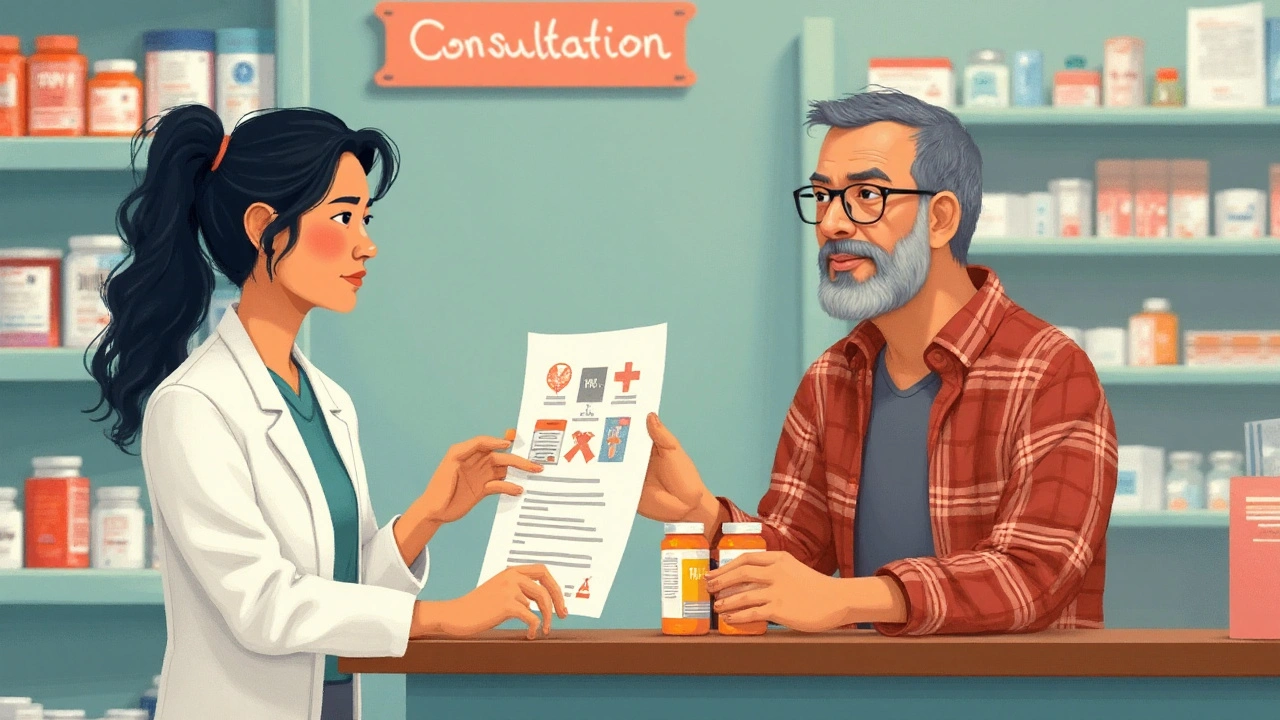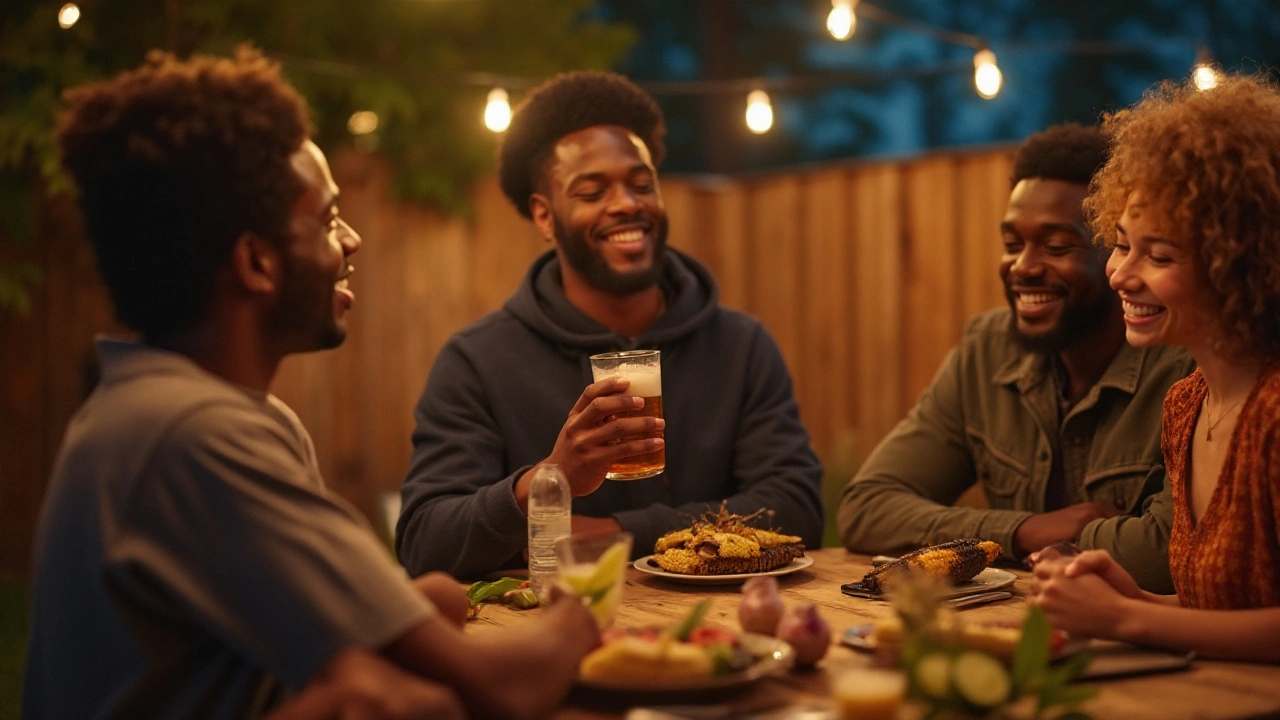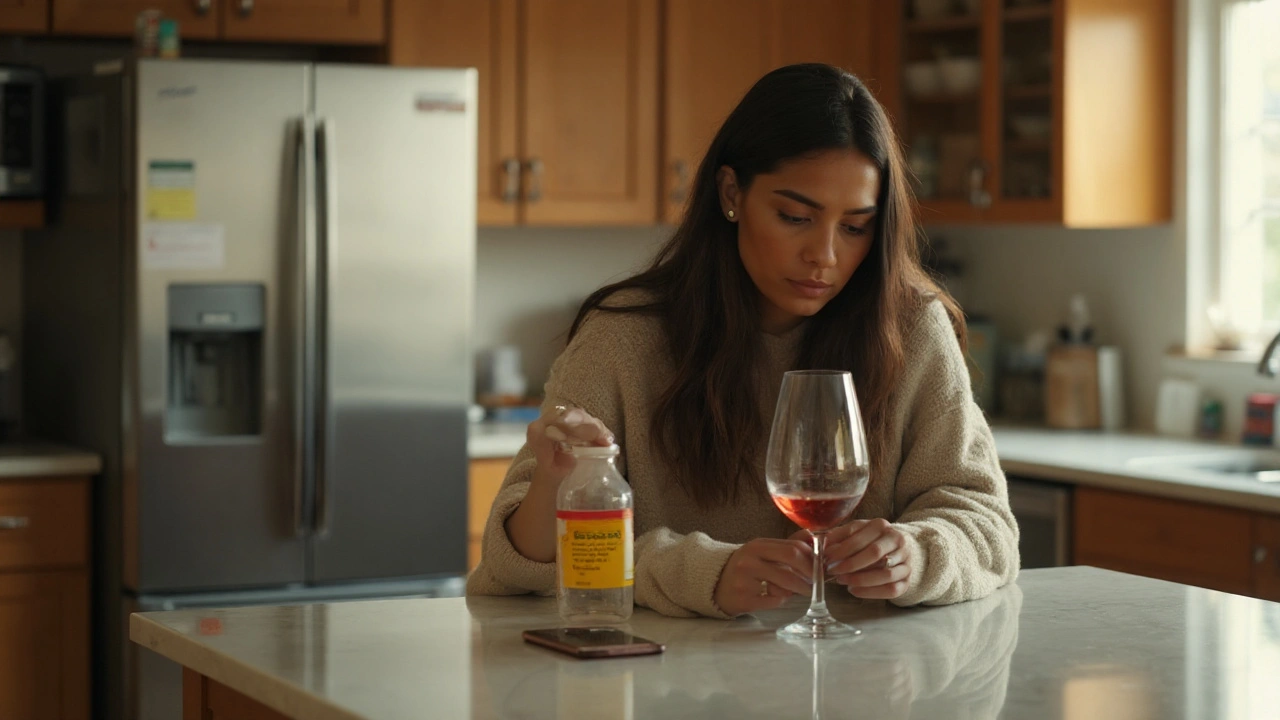If you’re on a medication and planning to drink, the key question isn’t “Will I be fine?”-it’s “What’s the real risk for my exact drug, dose, and body?” I’m in New York, where happy hours collide with cold meds, antibiotics, and ADHD prescriptions. I’ve watched smart people guess their way through this and pay for it. You don’t need to guess. This guide gives you practical rules, a quick decision flow, and clear consequences-so you can decide with your eyes open.
Set expectations: every drug label is different, and I’m not your clinician. This is real-world guidance backed by respected sources (FDA labeling, NIAAA 2024, CDC, American Geriatrics Society Beers Criteria 2023, ADA Standards of Care 2025, and major specialty societies). Use it to spot red flags fast, know when a drink is fine, and know when to skip it.
TL;DR - Key Takeaways
Here’s the short version you can use right now. If you only remember one phrase today, make it medications and alcohol.
- Zero-alcohol rule: opioids, benzodiazepines (like alprazolam), sleep meds (zolpidem, eszopiclone), barbiturates, muscle relaxers (carisoprodol), antipsychotics, disulfiram, and during acute withdrawal treatment. Mixing can stop breathing, knock you out, or both.
- High-risk combos to rethink:
- Acetaminophen (Tylenol): heavy or chronic drinking + high doses = liver injury. Keep total daily dose to 3,000 mg max (2,000 mg if you drink often), and avoid taking it during or right after heavy drinking.
- NSAIDs (ibuprofen, naproxen) + alcohol = stomach bleeds; risk multiplies with age, steroids, or blood thinners.
- Warfarin/DOACs + alcohol = bleeding risk. Unpredictable INR swings on warfarin.
- Diabetes meds (insulin, sulfonylureas) + alcohol = delayed low blood sugar, even overnight.
- Antidepressants: added sedation; bupropion raises seizure risk with heavy drinking or withdrawal; MAOIs + certain beers/wines = dangerous blood pressure spikes.
- ADHD stimulants + alcohol = poor judgment, heart strain, masking intoxication.
- Antibiotics myth check: You don’t have to avoid alcohol with most antibiotics, but a few are hard “no’s”: metronidazole, tinidazole, cefotetan (and certain others) for at least 72 hours after your last dose. Alcohol doesn’t “cancel” antibiotics, but it can worsen side effects and slow recovery.
- “How much” matters: One standard drink = 14 g ethanol (12 oz beer at 5%, 5 oz wine at 12%, 1.5 oz liquor at 40%). For older adults, those with liver disease, sleep apnea, or on multiple meds, even one can be too much.
- If you already mixed: stop drinking, hydrate, don’t drive, and watch for red flags (trouble breathing, vomiting + not waking, severe confusion, chest pain, black/tarry stools). Call emergency services when in doubt.
How to Decide Safely (Step-by-Step)
Use this simple flow when you’re unsure.
- Identify the exact drug: brand and generic, strength, and whether it’s extended-release. Many risks hinge on the dose and release type.
- Read the label’s alcohol warning: “Do not drink alcohol” isn’t a suggestion. If it says “avoid alcohol” or “may cause drowsiness,” take it seriously.
- Check your personal risk factors:
- Age 65+, pregnancy, liver disease, kidney disease, sleep apnea, history of substance use disorder.
- Driving, operating tools, being alone, or caring for kids tonight.
- New medication or dose change in the last 1-2 weeks.
- Class-based rule of thumb:
- Sedatives, opioids, antipsychotics: no alcohol.
- Antibiotics: most okay in moderation, except a short list (see table); still better to avoid if you’re sick.
- Pain meds: acetaminophen + heavy drinking risks liver; NSAIDs + alcohol risks bleeding; opioids are a no.
- Diabetes meds: alcohol can cause lows; plan food and glucose checks.
- Psych meds: expect more sedation; some combos are unsafe (bupropion, MAOIs).
- Make the call:
- If your med shows up in the “no alcohol” list, or you have high personal risk, skip the drink.
- If your med isn’t a known red flag and you’re low-risk, keep it to 1 standard drink, with food, spaced hours away from dosing.
- If you choose to drink, do it smarter:
- Eat first; sip slow; alternate with water.
- Stick with low-alcohol options; avoid energy drinks and shots.
- Don’t double your medication dose “because you’re drinking.” That’s how overdoses happen.
- Have a ride home planned. Sleep on your side if you feel very drowsy.
- If you already mixed:
- Stop drinking. Do not take extra meds overnight “for pain” or “for sleep.”
- Hydrate, eat, and don’t drive. Tell someone to check on you if you’re alone.
- Seek urgent care for severe drowsiness, slow breathing, chest pain, fainting, black vomit or stools, severe confusion, or blood sugar below 70 mg/dL you can’t correct.

Common Drugs vs Alcohol: What Happens and How to Handle It
This is the part most people need: practical, by-class risks and what to do. The table gives a quick view; the notes below add nuance.
| Medication/Class | Main Risk with Alcohol | What You Might Notice | Can You Drink? | Timing / Wait Guidance |
|---|---|---|---|---|
| Opioids (oxycodone, hydrocodone, morphine, tramadol) | Respiratory depression, overdose | Extreme drowsiness, slow/irregular breathing | No | Avoid entirely; at least 24-72h after last dose depending on formulation |
| Benzodiazepines (alprazolam, lorazepam), Z-drugs (zolpidem) | Blackout, falls, breathing suppression | Memory gaps, impaired coordination | No | Avoid; many have long half-lives (24-72h caution) |
| Muscle relaxants (carisoprodol, cyclobenzaprine) | Heavy sedation | Sleepiness, dizziness | Strongly discouraged | Skip alcohol during use |
| Acetaminophen (Tylenol) | Liver injury | Often silent; later nausea, jaundice | Light only; avoid heavy drinking | Max 3,000 mg/day (2,000 mg if frequent drinker) |
| NSAIDs (ibuprofen, naproxen, diclofenac) | Stomach bleeding | Stomach pain, black stools | Use caution | Take with food; avoid binges |
| Warfarin / DOACs (apixaban, rivaroxaban) | Bleeding (INR swings for warfarin) | Bruising, nosebleeds, GI bleeding | Minimize; discuss with clinician | Consistency matters; no binges |
| SSRIs/SNRIs (sertraline, fluoxetine, venlafaxine) | Sedation, bleeding risk (esp. with NSAIDs) | Sleepiness, worse mood swings | Light only, if your prescriber okays | Extra caution at start or dose changes |
| Bupropion | Seizures (esp. binge or withdrawal) | Jitters, anxiety, tremor | Preferably avoid | Do not binge; avoid abrupt alcohol stop |
| MAOIs (phenelzine, tranylcypromine) | Hypertensive crises (tyramine) | Headache, spike in BP | Usually avoid | Avoid tap beers, aged wines |
| ADHD stimulants (amphetamine, methylphenidate) | Heart strain, masking intoxication | Racing heart, poor judgment | Preferably avoid | If you drink, keep it to one, with food |
| Antipsychotics (quetiapine, olanzapine) | Severe sedation, low BP | Fainting, confusion | No | Skip alcohol entirely |
| Insulin, sulfonylureas (glipizide) | Delayed hypoglycemia | Sweats, shakiness, confusion | Minimize; plan meals | Check glucose overnight; carry carbs |
| GLP-1 RAs (semaglutide, tirzepatide) | Nausea, unpredictable intoxication | Vomiting, slow stomach | Light only | Avoid binges; watch pancreatitis symptoms |
| Metronidazole, tinidazole | Disulfiram-like reaction | Flushing, vomiting, low BP | No | Avoid alcohol during use + 72h after |
| Cefotetan (± cefoperazone) | Disulfiram-like reaction | Nausea, flushing | No | Avoid during + 72h after |
| Linezolid (MAOI-like) | BP spikes with tyramine drinks | Headache, palpitations | Often avoid alcohol; ask prescriber | Avoid aged/tap beers, certain wines |
| Antihistamines (diphenhydramine) | Sedation, poor coordination | Drowsy, slow reaction | Preferably avoid | Non-drowsy (loratadine) is safer |
| Cough/cold meds (dextromethorphan) | Impaired cognition; some syrups contain alcohol | Dizziness, nausea | Preferably avoid | Choose alcohol-free syrups |
| Disulfiram (Antabuse) | Severe reaction with any alcohol | Flushing, vomiting, hypotension | Absolutely no | Avoid alcohol during use + 14 days after |
| Naltrexone | Blocks opioid effects; may reduce craving | Nausea, dizziness | Drinking isn’t contraindicated | Tell surgeons; opioids won’t work well |
| Statins | Liver enzyme elevation (rare) | Usually none; muscle aches | Light is okay | Keep alcohol moderate |
| Paxlovid (nirmatrelvir/ritonavir) | Ritonavir drug interactions; liver load | Metallic taste, nausea | Preferably avoid | Skip alcohol during 5-day course |
Notes and nuance:
- NyQuil and some cough syrups contain alcohol. Read the inactive ingredients.
- “Non-alcoholic” beer can still have up to 0.5% alcohol-enough to trigger disulfiram reactions in some people.
- Kombucha can hold 0.5-2% alcohol depending on brewing. If you’re on disulfiram or recovering, skip it.
- Grapefruit isn’t alcohol, but it can dangerously raise levels of some meds. Don’t mix up those warnings.
- With GLP-1 meds (semaglutide/tirzepatide), your stomach empties slower; that can make alcohol hit harder and later. Go slow.
- On bupropion, big swings-binges or abrupt alcohol withdrawal-raise seizure risk. Be steady or avoid.
- Warfarin needs consistency. Binge drinking swings INR; daily small amounts can still alter dosing. Keep your care team in the loop.
Checklists, Heuristics, and a Quick Decision Tree
Keep these rules handy. They save headaches-literally.
Before you drink while on meds
- What’s the med, dose, and timing? Extended-release sticks around longer.
- Have you taken anything sedating in the last 24-72 hours?
- Are you driving, swimming, or supervising kids tonight?
- Any bleeding risks (age 65+, ulcers, blood thinners, steroids)?
- Diabetes? Do you have a plan for lows and a meter/snacks?
- Liver issues or heavy drinking pattern? Lean toward no alcohol.
Simple decision tree (text version)
- Is your medication a sedative, opioid, antipsychotic, or disulfiram? → Don’t drink.
- Is it metronidazole, tinidazole, cefotetan, or you’re on linezolid? → Don’t drink; wait the listed time after finishing.
- Are you on insulin/sulfonylurea without a clear plan for carbs and glucose checks? → Don’t drink.
- Do you have a bleeding risk (NSAIDs + alcohol, blood thinners, past GI bleed)? → Either don’t drink or keep to one with food and skip NSAIDs tonight.
- None of the above? → If you choose to drink, one standard drink, with food, spaced from dosing, and no driving.
Standard drink guide
- Beer: 12 oz at 5% ABV
- Wine: 5 oz at 12% ABV
- Spirits: 1.5 oz at 40% ABV
Wait-time cheat sheet
- Metronidazole/tinidazole/cefotetan: 72 hours after last dose.
- Disulfiram: 14 days after last dose (be careful with sauces, vinegars, mouthwashes).
- Short-acting opioids: avoid alcohol during therapy and at least 24 hours after the last dose; 72 hours for extended-release.
- Benzodiazepines and Z-drugs: avoid alcohol; many linger 24-72 hours depending on half-life and your age.
- Warfarin: no “wait time” removes risk; keep intake consistent if any and coordinate with your care team.
Red flags: call emergency services now
- Slow or irregular breathing, blue lips, can’t wake someone.
- Chest pain, fainting, new severe headache, one-sided weakness.
- Black or bloody stools, vomiting blood or coffee-ground material.
- Blood sugar below 70 mg/dL that doesn’t respond to fast carbs.
Pro tips from the field
- Space your medication and alcohol as far apart as you can. But spacing doesn’t fix dangerous combos like opioids and alcohol.
- Alcohol can be hidden in meds and foods (sauces, desserts, cough syrups). Check labels.
- Sleeping it off can be risky with sedatives and alcohol. If someone is snoring loudly and hard to wake, roll them on their side and monitor breathing.
- If you drink most days, tell your clinician. Your safe acetaminophen cap is probably 2,000 mg/day, and some meds may need dose changes.

FAQ and What to Do Next
Is one beer okay with antibiotics?
Usually yes, but not with metronidazole, tinidazole, cefotetan (wait 72 hours after finishing). Alcohol won’t “cancel” most antibiotics, but it can make you feel worse and slow recovery. If you’re sick enough to need antibiotics, skipping the beer is the fastest path back to normal.
Will alcohol stop my birth control from working?
No direct effect on hormone levels. The real risk is missed pills or vomiting. If you vomit within two hours of taking a pill, use backup and follow your pack’s missed-pill rules. Binge nights are where most surprises happen.
Can I drink on antidepressants?
Light drinking is often allowed on SSRIs/SNRIs if your prescriber agrees. Expect more sedation and worse hangovers. On bupropion, avoid binges and abrupt alcohol withdrawal due to seizure risk. On MAOIs, avoid certain beers and wines high in tyramine; many folks skip alcohol entirely.
What about ADHD meds?
Alcohol and stimulants don’t mix well. Alcohol feels weaker, so people over-drink. Your heart works harder and judgment drops. Best move is to skip drinking; if you do, keep it to one, eat first, and plan a ride.
Is acetaminophen or ibuprofen safer with alcohol?
Different risks. Acetaminophen stresses the liver with heavy/chronic drinking; ibuprofen raises stomach bleeding risk, especially above age 60 or if you’ve had an ulcer. If you had more than a drink or two, avoid both tonight if you can; try non-drug options (cool compress, hydration). If you must choose, use the lowest effective dose, with food, and don’t stack them without medical advice.
Can I drink on Ozempic/Wegovy (semaglutide) or Mounjaro/Zepbound (tirzepatide)?
Light drinking is usually okay, but alcohol can worsen nausea, and intoxication can sneak up due to slower stomach emptying. If you’ve ever had pancreatitis, avoid alcohol. Keep it to one, eat first, and stop at the first hint of nausea.
What about Paxlovid?
Short course, lots of drug-drug interactions from ritonavir. Skip alcohol for the five days. You won’t miss it while fighting COVID, and you’ll avoid extra liver stress and dizziness.
Do I need to avoid alcohol with statins?
Light drinking is usually fine. Heavy drinking raises your chance of liver enzyme bumps and muscle issues. Keep it moderate and tell your clinician if you notice muscle pain or dark urine.
Does alcohol interact with metformin?
Heavy drinking can raise the risk of lactic acidosis, especially if you’re dehydrated or have kidney problems. Light drinking with food is typically fine, but avoid binges.
Can I have a nightcap if I took Benadryl?
I wouldn’t. Diphenhydramine plus alcohol turns you into a fall risk and wrecks your sleep quality. If allergies are bugging you, switch to a non-drowsy option (loratadine, cetirizine) and avoid alcohol.
What if I’m on disulfiram (Antabuse)?
Strict zero alcohol-including sauces, vinegars, some desserts, mouthwashes, aftershaves, and “NA” beers. The reaction can be severe. Keep a list of hidden sources.
Does alcohol make antibiotics less effective?
Not directly for most antibiotics, but being dehydrated, sleeping poorly, and missing doses absolutely does. Support your immune system; skip alcohol until you’re better.
How do I read my label for alcohol warnings?
Look for “Do not use with alcohol,” “Avoid alcoholic beverages,” “May cause drowsiness,” and “Caution operating machinery.” If you see any of those, that’s your nudge to skip the drink.
Is red wine “healthier” with meds?
Alcohol is alcohol. ABV and dose matter more than the type. Don’t justify a risky combo because it’s wine.
Next steps if you have an event coming up
- Make a quick med list on your phone: name, dose, when you take it.
- Ask your pharmacist, “Is light drinking okay on this? Any timing tricks?” Pharmacists love these questions.
- Pick a default: zero alcohol on sedatives/opioids/antipsychotics/“avoid alcohol” labels; one drink max with food on low-risk meds.
- Plan post-event: hydrate, skip bedtime sedatives, and don’t take extra pain meds overnight.
Troubleshooting common real-life scenarios
- You took NyQuil and forgot it has alcohol. Skip drinks tonight and tomorrow. Don’t add Benadryl or sleep meds.
- You binged and now have a headache. Avoid acetaminophen and NSAIDs if you can; try water, electrolytes, caffeine, a light snack, and rest. If you must medicate, use the lowest dose and don’t combine painkillers.
- You’re on insulin and had two drinks. Eat a snack before bed, check your glucose before sleep and overnight if you can. Keep fast-acting carbs within reach.
- On warfarin and drank more than usual. Watch for bruising/bleeding and call your clinic for an INR check. Be honest about intake; it changes dosing.
- On bupropion and relapsed into heavy drinking. Don’t stop alcohol abruptly without help; withdrawal raises seizure risk. Call your clinician or a hotline for a taper plan or medical support.
Why you can trust these rules
They align with FDA medication guides and labeling, the National Institute on Alcohol Abuse and Alcoholism’s current guidance (2024), CDC’s standard drink definitions, the American Geriatrics Society 2023 Beers Criteria for high-risk meds in older adults, the American Diabetes Association Standards of Care (2025), and major specialty guidelines (psychiatry, infectious disease, cardiology). Labels evolve-when in doubt, your pharmacist is the fastest expert you can reach.
Last word: you don’t have to be perfect. You just need a system. Identify the drug. Scan the warning. Check your risk. Decide with intention. If you slip, protect yourself, watch for red flags, and get help early.
